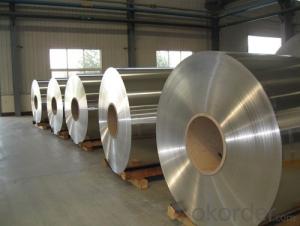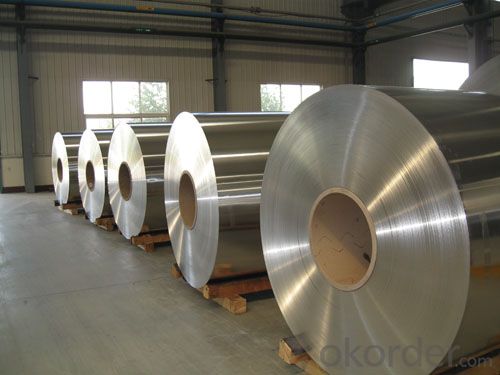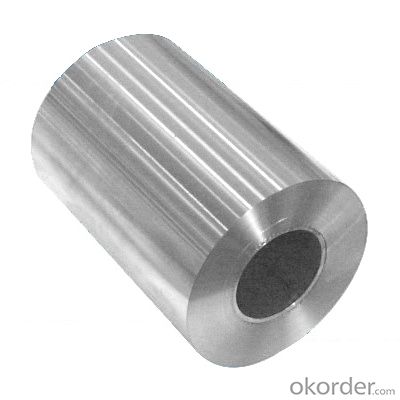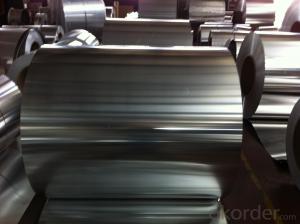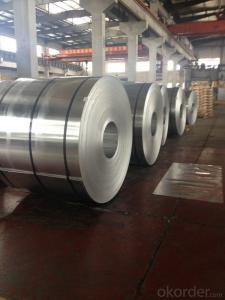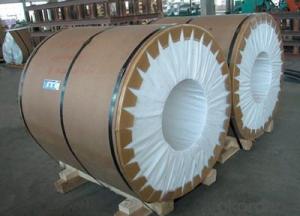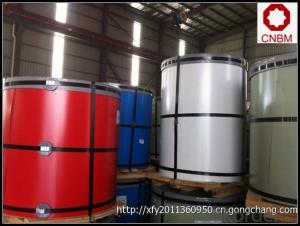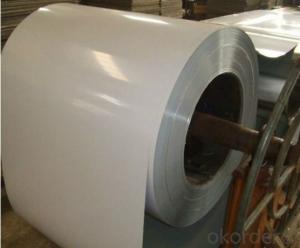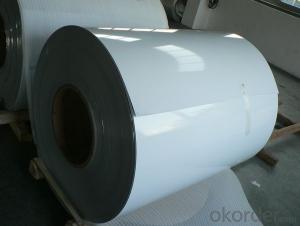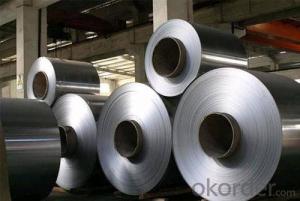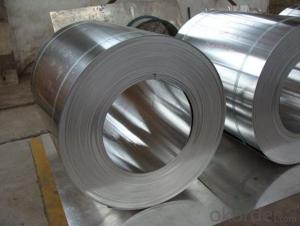Coating Aluminum Coil 1100 1050 1060 1235 Pure Aluminum Coil for PP Cap
- Loading Port:
- Shanghai
- Payment Terms:
- TT OR LC
- Min Order Qty:
- 5 m.t.
- Supply Capability:
- 5000 m.t./month
OKorder Service Pledge
Quality Product, Order Online Tracking, Timely Delivery
OKorder Financial Service
Credit Rating, Credit Services, Credit Purchasing
You Might Also Like
Specification
Grade:
1000 Series,3000 Series,5000 Series
Surface Treatment:
Brushed,Enameled Wire,Color Coated,Mill Finish,Embossed,Coated
Shape:
Rectangular,Flat,T-Profile,Angle
Temper:
T3-T8,Half Hard,Soft,T351-T851
Application:
Pharmaceutical,Transportation Tools,Decorations,Kitchen Use
Technique:
DC/CC
Thickness:
0.05-4.0mm
Width:
200mm---980mm
Outer Diameter:
450-600
Net Weight (kg):
2.5 ton
Packaging:
Wooden pallets
1100 1050 1060 1235 Pure Aluminum Coil for PP Cap
Packaging & Delivery
Product Specification | |
Grade | 1000 Series: 1050 1060 1100 3000 Series: 3003 3004 3105 5000 Series: 5052 5605,5083 6000 Series: 6061 6063 8000 Series: 8011 8021 8079 |
Thickness | 0.20-8.00mm |
Width | 2400mm max. |
Grade | 1000,3000,5000,6000,8000series |
Coil ID | 75mm, 150mm, 200mm, 300mm, 400mm, 508mm or negotiable |
Coil weight | 1000-5000kgs |
Coil OD | 1700mm max. |
Temper | O, H12, H14, H16, H111, H22 ,H24, H26, H28,T4, T6,etc. |
| Temper | |
| F | processing state |
| H | strain hardening state |
| O | annealing |
| T | heat treatment state |
| H112 | pure state of strain hardening, adjustment has been made to degree of strain hardening and annealing |
| T4 | solid solution treatment and natural efficiency to achieve sufficient stability condition |
| T5 | artificial aging condition of the reentry after high temperature thermal cooling |
| T6 | artificial aging state after solid solution treatment |
Chemical Composition | |||||||||
| Grade | Si | Fe | Cu | Mn | Mg | Cr | Ni | Zn | Al |
| 1050 | 0.25 | 0.4 | 0.05 | 0.05 | 0.05 | - | - | 0.05 | 99.5 |
| 1060 | 0.25 | 0.35 | 0.05 | 0.03 | 0.03 | - | - | 0.05 | 99.6 |
| 1070 | 0.2 | 0.25 | 0.04 | 0.03 | 0.03 | - | - | 0.04 | 99.7 |
| 1100 | Si+Fe:0.95 | 0.05-0.2 | 0.05 | - | - | 0.1 | - | 99 | |
| 1200 | Si+Fe:1.00 | 0.05 | 0.05 | - | - | 0.1 | 0.05 | 99 | |
| 1235 | Si+Fe:0.65 | 0.05 | 0.05 | 0.05 | - | 0.1 | 0.06 | 99.35 | |
| 3003 | 0.6 | 0.7 | 0.05-0.2 | 1.0-1.5 | - | - | - | 0.1 | remains |
| 3004 | 0.3 | 0.7 | 0.25 | 1.0-1.5 | 0.8-1.3 | - | - | 0.25 | remains |
| 3005 | 0.6 | 0.7 | 0.25 | 1.0-1.5 | 0.20-0.6 | 0.1 | - | 0.25 | remains |
| 3105 | 0.6 | 0.7 | 0.3 | 0.30-0.8 | 0.20-0.8 | 0.2 | - | 0.4 | remains |
| 3A21 | 0.6 | 0.7 | 0.2 | 1.0-1.6 | 0.05 | - | - | 0.1 | remains |
| 5005 | 0.3 | 0.7 | 0.2 | 0.2 | 0.50-1.1 | 0.1 | - | 0.25 | remains |
| 5052 | 0.25 | 0.4 | 0.1 | 0.1 | 2.2-2.8 | 0.15-0.35 | - | 0.1 | remains |
| 5083 | 0.4 | 0.4 | 0.1 | 0.40-1.0 | 4.0-4.9 | 0.05-0.25 | - | 0.25 | remains |
| 5154 | 0.25 | 0.4 | 0.1 | 0.1 | 3.1-3.9 | 0.15-0.35 | - | 0.2 | remains |
| 5182 | 0.2 | 0.35 | 0.15 | 0.20-0.50 | 4.0-5.0 | 0.1 | - | 0.25 | remains |
| 5251 | 0.4 | 0.5 | 0.15 | 0.1-0.5 | 1.7-2.4 | 0.15 | - | 0.15 | remains |
| 5754 | 0.4 | 0.4 | 0.1 | 0.5 | 2.6-3.6 | 0.3 | - | 0.2 | remains |
| 6061 | 0.40-0.8 | 0.7 | 0.15-0.40 | 0.15 | 0.8-1.2 | 0.04-0.35 | - | 0.25 | remains |
| 6063 | 0.20-0.6 | 0.35 | 0.1 | 0.1 | 0.45-0.9 | 0.1 | - | 0.1 | remains |
| 6082 | 0.7-1.3 | 0.5 | 0.1 | 0.40-1.0 | 0.6-1.2 | 0.25 | - | 0.2 | remains |
| 6A02 | 0.50-1.2 | 0.5 | 0.20-0.6 | Or Cr0.15-0.35 | 0.45-0.9 | - | - | 0.2 | remains |
| 8011 | 0.50-0.9 | 0.6-1.0 | 0.1 | 0.2 | 0.05 | 0.05 | - | 0.1 | remains |
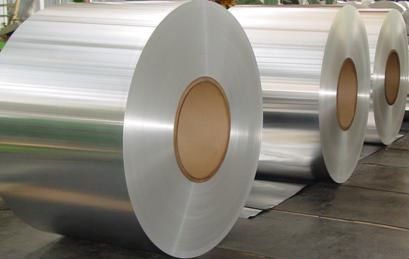
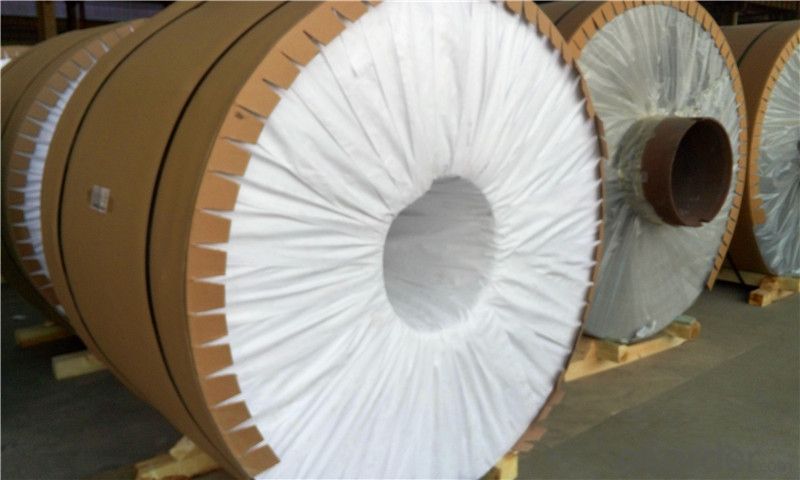
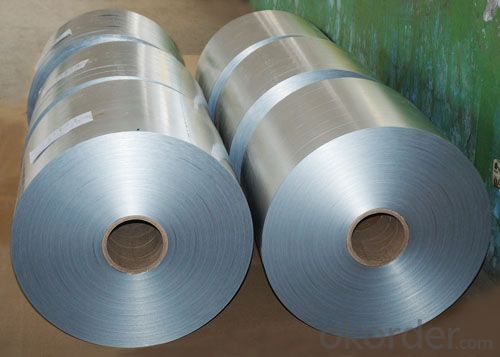
- Q: What are the common applications of aluminum coils in the aerospace industry?
- Aluminum coils are commonly used in the aerospace industry for various applications such as constructing aircraft frames, manufacturing wings, building fuselages, and designing engine components. The lightweight yet strong nature of aluminum makes it an ideal choice for these purposes, as it helps reduce overall aircraft weight, enhance fuel efficiency, and improve performance. Additionally, aluminum's corrosion resistance properties play a crucial role in ensuring the longevity and durability of aerospace structures.
- Q: Are aluminum coils suitable for outdoor signage and displays?
- Yes, aluminum coils are suitable for outdoor signage and displays. Aluminum is a highly durable and weather-resistant material, making it an excellent choice for outdoor applications. It is known for its ability to withstand extreme temperature variations, UV rays, moisture, and corrosion. Aluminum coils are lightweight, yet strong, which makes them easy to handle and install. They are also versatile and can be easily shaped and formed into various sizes and designs. In addition, aluminum has excellent printability, allowing for vibrant and long-lasting graphics. Overall, aluminum coils provide a reliable and cost-effective solution for outdoor signage and displays.
- Q: How are aluminum coils protected against UV exposure during storage?
- Aluminum coils are typically protected against UV exposure during storage through the application of a protective coating or the use of UV-resistant packaging materials. Aluminum coils are highly susceptible to UV degradation, which can result in discoloration, surface damage, and reduced performance. Therefore, manufacturers and distributors take special precautions to ensure that the coils are shielded from harmful UV rays. One common method is the application of a protective coating on the surface of the coils. This coating acts as a barrier between the aluminum material and UV radiation, preventing direct exposure. The coating is typically a specialized paint or lacquer that contains UV inhibitors, which absorb or reflect UV rays, thereby minimizing damage to the coils. This protective layer also helps to preserve the aesthetic appearance of the coils and extend their lifespan. In addition to coatings, aluminum coils can also be stored in UV-resistant packaging materials. These materials are designed to block or absorb UV radiation, effectively creating a shield around the coils. Common UV-resistant packaging materials include polyethylene films, which are specifically formulated to provide excellent UV protection. By storing the coils in such packaging, they are safeguarded against direct sunlight and other sources of UV radiation. It is worth noting that UV protection measures are particularly crucial during long-term storage or transportation, as the coils may be exposed to UV rays for extended periods. By implementing these protective measures, manufacturers and distributors ensure that the aluminum coils maintain their quality and performance, even when stored in environments with high UV exposure.
- Q: Is it possible to utilize aluminum coils for crafting artistic installations or distinctive creations?
- <p>Yes, aluminum coils can be used to create art installations and other unique creations. Their malleability, durability, and lightweight nature make them ideal for sculptural works. Artists can bend, shape, and weld aluminum coils into various forms, offering a wide range of design possibilities. The material's reflective surface can also add visual interest, especially when used in installations that interact with light and shadow. Additionally, aluminum's resistance to corrosion makes it suitable for outdoor art pieces, ensuring longevity and low maintenance.</p>
- Q: Is it possible to construct a lampshade using an aluminum coil?
- <p>Yes, you can use an aluminum coil to make a lampshade. Aluminum is a lightweight, durable, and heat-resistant material, making it suitable for lampshade construction. You can bend and shape the coil into a desired form and attach it to the lamp base. Ensure proper electrical insulation and avoid direct contact between the coil and the light bulb to prevent overheating. It's advisable to use a professional or follow detailed instructions to ensure safety and a quality result.</p>
- Q: How do aluminum coils compare to titanium coils in terms of weight?
- In terms of weight, aluminum coils are considerably lighter than titanium coils. This is due to aluminum having a lower density than titanium, resulting in aluminum weighing less than titanium for the same volume. This quality makes aluminum coils highly favored in industries like aerospace and automotive where reducing weight is essential. On the other hand, titanium coils are renowned for their exceptional strength and excellent corrosion resistance, making them ideal for environments that prioritize durability. Ultimately, the decision between aluminum and titanium coils depends on the specific needs and compromises sought for a particular application.
- Q: What are the dimensions of an aluminum coil?
- The dimensions of an aluminum coil can vary depending on the specific application and manufacturer. However, common dimensions for aluminum coils range from 0.15mm to 8mm in thickness, and from 20mm to 2000mm in width. The length of an aluminum coil can be customized to meet specific requirements.
- Q: What are the methods to prevent rust formation on steel coils during storage and transportation?
- <p>To prevent rust on steel coils during storage and transportation, follow these steps: 1. Keep the coils dry and avoid exposure to moisture. 2. Use rust inhibitors or anti-corrosion coatings on the coils. 3. Store the coils in a clean, dry, and well-ventilated area. 4. Use protective wrapping materials like plastic film or corrosion-resistant paper. 5. Ensure proper stacking and avoid direct contact between coils. 6. Use rust-resistant materials for transportation containers. 7. Regularly inspect the coils for signs of rust and address any issues promptly. By implementing these measures, you can significantly reduce the risk of rust formation on steel coils.</p>
- Q: What are the different coil handling methods for aluminum coils?
- To ensure the safe and efficient handling and storage of valuable aluminum coils, there are various methods available. Here are several options: 1. Manual Handling: This approach involves the physical lifting and movement of aluminum coils using manual labor. It necessitates proper training and the use of personal protective equipment to prevent injuries. Manual handling is suitable when dealing with smaller coils or when specialized equipment is unavailable. 2. Forklift Handling: Forklifts are commonly utilized for the handling of aluminum coils. They come equipped with specially designed coil lifters or C-hooks, which securely lift and transport the coils. Forklifts offer a more efficient and quicker method for handling larger and heavier coils. 3. Coil Lifters: Coil lifters are specialized lifting devices specifically designed for aluminum coil handling. They utilize a combination of clamps and hooks to securely grip and transport the coils. Coil lifters are often used alongside cranes or forklifts. 4. C-Hooks: C-hooks are another commonly employed method for handling aluminum coils. These hooks are attached to cranes or other lifting equipment and are designed to securely cradle the coil. C-hooks facilitate easy and controlled movement of the coil and are suitable for coils of various sizes. 5. Coil Tippers: Coil tippers are utilized to tilt the coils horizontally or vertically, making loading or unloading easier. This method reduces the risk of coil damage during handling and enhances efficiency by enabling coils to be easily placed on or removed from racks or pallets. 6. Coil Carriers: Coil carriers refer to specialized trailers or trucks specifically designed for transporting aluminum coils. They feature built-in coil cradles or beds that securely hold the coils during transportation. These carriers often have adjustable supports to accommodate different coil sizes and prevent shifting during transit. Ultimately, the choice of coil handling method depends on factors such as coil size, weight, and specific requirements. It is crucial to select the appropriate handling method to ensure worker safety, prevent coil damage, and maintain the quality of the aluminum.
- Q: What are the different alloys used in aluminum coils?
- Some of the different alloys used in aluminum coils include 1100, 3003, 5052, and 6061.
Send your message to us
Coating Aluminum Coil 1100 1050 1060 1235 Pure Aluminum Coil for PP Cap
- Loading Port:
- Shanghai
- Payment Terms:
- TT OR LC
- Min Order Qty:
- 5 m.t.
- Supply Capability:
- 5000 m.t./month
OKorder Service Pledge
Quality Product, Order Online Tracking, Timely Delivery
OKorder Financial Service
Credit Rating, Credit Services, Credit Purchasing
Similar products
Hot products
Hot Searches
Related keywords
